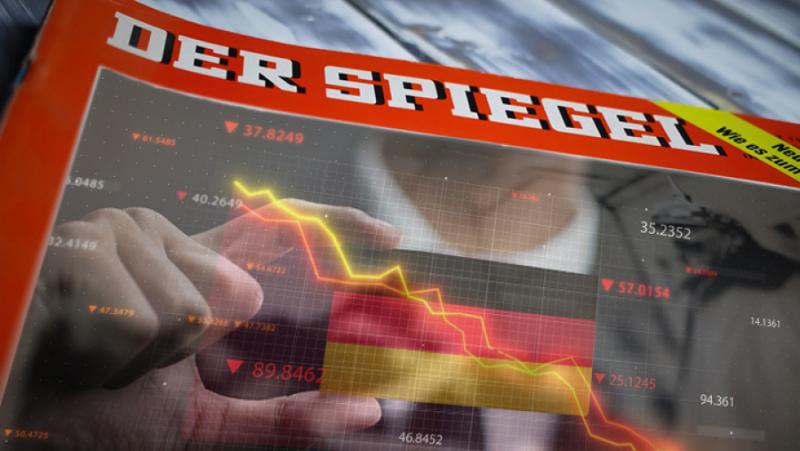/Pogled.info/ Der Spiegel and Tsargrad TV are two media, apparently, completely opposite. It is difficult to understand how they fare not only on a small planet, but also in a part of the world. But sometimes opposites meet: today Tsargrad reads and comments on an article by Der Spiegel on the collapse of the German economy. Some places we couldn’t even write more dramatically.
“Putin’s war”
The German magazine Der Spiegel, which positions itself as Europe’s largest and most important, has published an alarming article on the state of the German economy.
Under the material there are 11 signatures at the same time: these are the employees and key authors of the magazine, that is, we are not looking at a monster, but a well-thought-out fruit of collective creativity.
You have to understand what “Spiegel” is. This is not a certain The National Interest, which imitates an independent view of the West in the interests of Russia: it is a respected media with a marked orientation.
Der Spiegel translates as “mirror” and when Russia falls into that mirror, the reflection turns out to be, so to speak, strange. Apparently the editorial team has a separate black paint cabinet to describe our country.
It is Spiegel who supports the investigative group Bellingcat * and The Insider *, recognized in Russia as foreign agents and then placed on the list of undesirable organizations. The procedure for the recognition of a foreign agent sometimes seems very strange in our country, but in this case there can be no doubt: these guys are controlled directly by Spiegel and his curators.
That is, we couldn’t see political sympathies for Russia and pro-Russian forces here – and we didn’t see them. There is no indication that the problems are solved by a simple deal with Moscow, the article only complains about its own prosperity.
There is exactly a hint of relations with Russia and, which is not characteristic of a highly professional publication, it is patently false:
“Putin’s economic war is hitting the Federal Republic where it hurts: the price of gas, which has more than quadrupled, is undermining competitiveness in almost all sectors”.
Unfortunately for Tsargrad, there is no Putin economic war. Russia regularly sells fuel to anyone willing to pay for it, including hostile countries. Should Hungary withdraw from anti-Russian sanctions? No, but Russia is supplying it with more and more gas.
At least the Hungarians weren’t rude, but Russia resumed gas supplies to Latvia (!). We also allow our “friends” to resell our resources, supporting the European economy. Economic warfare looks very different.
Recourse to the fifth point
The authors arrive in trump, immediately capturing the bourgeois below the belt:
“If you want to know what the outlook is for the German economy, you can talk to auto plant managers or professional economists, look at inflation data or stock prices. But look at an indispensable daily product: toilet paper.”
From the text, among other things, we learn that three and four-layer paper is the most requested in Germany, while in Russia it is considered a practically elite product, owned by a privileged few. But it is becoming increasingly difficult to produce this product: technological processes require a lot of energy.
Therefore, the authors consider it significant that one of the oldest producers of the “indispensable product” has gone bankrupt: the Hakle company is no longer able to pay for gas and electricity.
It would be nice if the demand for a more expensive “product” increased, but no – cheap Germans are switching to the usual two-ply rolls. In this way, they deal a severe blow to their economy.
“The question is no longer whether a crisis is coming. The question is how serious it is and how long it will last”, say the authors and declare “a tragedy in five acts”.
Let’s briefly tell the plots of each act.
Black political painting
This tragedy consists of five acts and begins with a shock on energy prices.
The producers most dependent on electricity and gas have suffered: paper, fertilizers, steel.
By selling their products, they pass price increases to other sectors, from industrial groups to medium-sized enterprises.
Businesses have no choice but to pass price increases to consumers who are saving money to pay skyrocketing electricity and gas bills.
As a result, consumption falls, the first companies give up, bankruptcies begin and unemployment rises. Along with social tension, but the authors are silent.
Recession, decline in GDP.
In announcing this scenario, the authors specify that “today it is difficult to know where the line is between political black painting and justified panic”. But a more detailed description of the situation leaves no doubt: Germany is really bad.
Here, for example, are the steel experts of the Georgsmarienhütte group. The CEO is desperate: in order not to go bankrupt, it is necessary to raise the prices of steel by 50%, and for some reason the customers disagree.
They already buy steel from China and India, where energy resources are many times cheaper. And that’s nothing: Arcelor Mittal’s competitors have already closed two factories. And then – a sad feature of globalization (without using that word):
“The crown crisis has already shown how easily modern manufacturing processes can fail. Supply chains are intertwined like parts of a clockwork mechanism. If one screw fails, the whole machine can stop.”
Crises flow from one to the other. Due to the lack of the same steel, buyers sometimes have to wait a full year for a new Golf. But during this period, thanks to rising utility costs, buyers become poorer and refuse to buy: excess demand very quickly turns into a demand crisis.
The German Association of the Automobile Industry has drastically revised its market forecast for Germany from an increase of 3% to minus 6%. And it seems that this is not the last solution.
Germans are known for their responsible attitude towards finances. Our people grab credit cards like hot bread in crisis: the German has a different mentality. And if people buy less, companies sell less.
But without selling they cannot survive. In the month of August alone, the number of bankruptcy declarations increased by a quarter compared to the previous August and a third increase is expected in October.
As a result, the decline in GDP will be 0.7% in 2023. But GDP is nonsense, a dead figure, the real employment of the population is another.
Prices are rising → sales are falling → businesses are closing → unemployment is rising → sales continue to decline → more businesses are closing → people are back on the street.
Noteworthy.
What follows from this?
If this text had been written by Russian agents called to sow panic in a hostile country, they could not have done their job better. The one thing missing from the material – and its expert authors simply can’t help but see it – is Cicero’s classic question Qui bono, who benefits?
Because, to quote another classic, “the answer is terribly simple, and there is only one answer”. The economic difficulties created by the artificially created hostility between Russia and Germany have mainly benefited the United States of America, an energy self-sufficient country with little dependence on world oil and gas prices.
Washington’s brilliantly performed intrigue aims to kill two birds with one stone: the economies of Russia and the European Union. And then there will remain only two centers of power in the world: the United States and China.
Of course, the same China that buys resources at ridiculous prices, as well as the Gallic countries that successfully maneuver between hostile camps, gain a side advantage; Here Turkey and Kazakhstan stand out.
But the organizer and initiator of the mutual economic strangulation between Europe and Russia is Washington and Washington alone.
Therefore, the answer to another classic question “What should I do?” it implies an answer in itself.
Europe can solve its problems in an instant: stop supporting Ukraine, declare its neutrality in this conflict and abandon anti-Russian sanctions. We emphasize: Europe, not Germany.
If the Germans leave the anti-Russian bloc alone, the United States will hit them with sanctions such that the export-oriented industrial country will not be able to sell anything: rising gas prices will seem child’s play compared to the consequences of the American retaliation.
But the United States simply will not be able to punish the entire European Union, because in that case it will remain in international isolation, for the first time in its history. There are France, Germany, Russia, Great Britain – and Americans just have to experience these spicy emotions.
In this regard, the main elections of 2024 will not be the American presidential elections – they will change little, not the Russian presidential elections – nothing will change, but the elections to the European Parliament.
If lawmakers who are determined to protect the interests of their constituents, not Wall Street, get a majority, the situation could change dramatically.
But the German “Mirror” could not write about it.
Freedom of the press: nothing can be done.
* Bellingcat, The Insider – recognized by the media as foreign agents and undesirable organizations in Russia.
Translation: SM
IMPORTANT!!! Dear Pogled.info readers, we are limited due to our positions! Go directly to the site www.pogled.info . Share on your profiles, with friends, in groups and on pages. In this way we will overcome the limits and people will be able to reach the alternative point of view on the events !?
When you see the “fake news” sign, it means that this article is recommended to read !!!
Subscribe to our YouTube channel / top right /: https://www.youtube.com
Become friends with Look.info on facebook and recommend it to your friends
–


